

As COVID's Omicron variant spreads, an Australian research team is 'very concerned' about discovery on its origins. For the past week virologist Sarah Palmer and her colleagues at The Westmead Institute’s Centre for Virus Research in Sydney have been working overtime to unlock the secrets of COVID-19's Omicron variant.

Like detectives solving a crime, Professor Palmer and post-doctoral fellow Eunok Lee have gathered evidence from a collection of Omicron sequences taken from patients across the globe since November. Their mission is to try to understand the variant and to predict what it is likely to do next. For anyone who is screaming that this next step should be "shut the borders! ", Palmer believes Australia’s newly relaxed border settings remain appropriate. (More on why, later). Professor Catherine Bennett, the chair in epidemiology at Deakin University agrees, but adds "the timing is terrible". Space to play or pause, M to mute, left and right arrows to seek, up and down arrows for volume.
Yet it is clear we are about to discover for the first time what living with coronavirus really feels like. SARS-CoV-2's origin should be investigated worldwide for pandemic prevention. How contagious is Delta? How long are you infectious? Is it more deadly? A quick guide to the latest science. Delta was recognised as a SARS-CoV-2 variant of concern in May 2021 and has proved extremely difficult to control in unvaccinated populations.
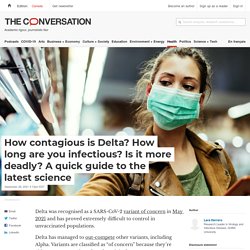
Delta has managed to out-compete other variants, including Alpha. Variants are classified as “of concern” because they’re either more contagious than the original, cause more hospitalisations and deaths, or are better at evading vaccines and therapies. Or all of the above. So how does Delta fare on these measures? And what have we learnt since Delta was first listed as a variant of concern? Read more: Is Delta defeating us? How contagious is Delta? The R0 tells us how many other people, on average, one infected person will pass the virus on to. How contagious is Delta? How long are you infectious? Is it more deadly? A quick guide to the latest science. Delta was recognised as a SARS-CoV-2 variant of concern in May 2021 and has proved extremely difficult to control in unvaccinated populations.
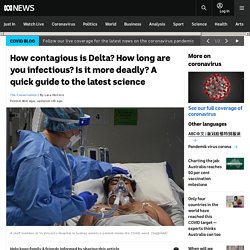
Delta has managed to out-compete other variants, including Alpha. Variants are classified as "of concern" because they're either more contagious than the original, cause more hospitalisations and deaths, or are better at evading vaccines and therapies. Or all of the above. So how does Delta fare on these measures? What is the mu variant of the coronavirus? By MARIA CHENG September 8, 2021 GMT What is the mu variant?
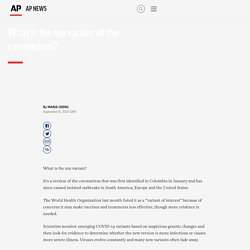
It’s a version of the coronavirus that was first identified in Colombia in January and has since caused isolated outbreaks in South America, Europe and the United States. The World Health Organization last month listed it as a “variant of interest” because of concerns it may make vaccines and treatments less effective, though more evidence is needed. Scientists monitor emerging COVID-19 variants based on suspicious genetic changes and then look for evidence to determine whether the new version is more infectious or causes more severe illness. We've heard a lot about underlying medical conditions throughout the pandemic. But what do they actually include? For those fixed to the daily news cycle, "underlying medical conditions" is no doubt a familiar phrase.
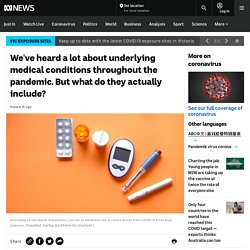
"They are reasons to rush to get your vaccine rather than rushing to get a place in ICU," Victoria's Chief Health Officer Brett Sutton stressed on Tuesday. It's a sentiment that's been echoed throughout the pandemic by public health authorities who have long warned of the risks, and human toll, of coronavirus. But what does an underlying medical condition actually entail? These are the biggest risk factors First and foremost, it's important to note that anyone can develop serious or severe illness from COVID-19. But those with chronic health conditions or a weakened immune system are at greater risk. Virologist Eddie Holmes lays out how COVID will likely shape our lives in the years to come. The world will likely be playing "cat and mouse" with the virus that causes COVID-19 for the rest of our lives, a leading virologist says.

The University of Sydney's Eddie Holmes was named NSW's Scientist of the Year in 2020 for his work early in the pandemic establishing that SARS-CoV-2 was the cause of COVID-19. He was also one of the first people to publicly release the genome sequence of the virus. As NSW, Victoria and the ACT battle significant outbreaks of the Delta variant and race to get more people vaccinated, there is a great deal of focus on how the weeks and months ahead will look. Professor Holmes has his focus fixed a few steps further, and he has some predictions about what role the virus might play in our lives in the years to come.
The best case scenario Even under what Professor Holmes calls the "best case scenario", the virus is here to stay. "Best case scenario, the virus is never going to go away, but maybe quickly it will evolve to become less virulent," he said. Will Covid-19 get worse than the delta variant? No one knows. The delta variant of the coronavirus is here.
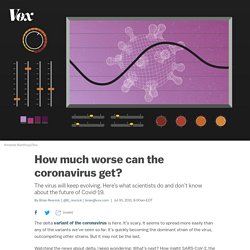
It’s scary. It seems to spread more easily than any of the variants we’ve seen so far. It’s quickly becoming the dominant strain of the virus, outcompeting other strains. But it may not be the last. Why Delta COVID-19 variant could put younger people at risk of deadly cardiac complications. The Delta COVID-19 variant could be putting young, healthy people at greater risk of fatal heart complications, according to the director of Australia's leading cardiac research centre.
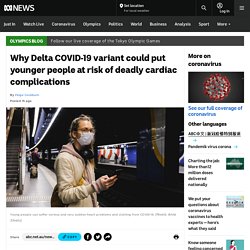
Key points: The Delta variant of COVID-19 appears to be causing more serious health problems for young peopleIn the last two weeks two young people with COVID-19 died in SydneyYoung people are far more likely to develop heart inflammation from COVID-19 than Pfizer While earlier strains of the virus were most deadly among the elderly, Professor Jason Kovacic, from Sydney's Victor Chang Cardiac Research Institute, said there was evidence to suggest Delta was different. He said the variant, which was first identified in India and is now the subject of outbreaks in NSW, Queensland and Victoria, appeared to cause more serious infections and complications in younger people. "The data is still emerging on exactly how common the cardiac side effects are with this strain," he said. Key points: The Lambda variant: Is it more infectious and can it escape vaccines?
The Lambda coronavirus variant was first reported in Peru in December 2020, according to the World Health Organization.
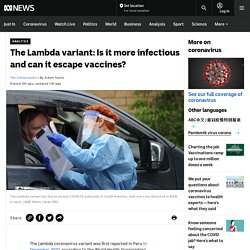
It then spread to multiple countries in South America, where it currently accounts for over 20 per cent of detected variants. One case of Lambda was recorded in hotel quarantine in New South Wales in April. Lambda has now been detected in more than 20 countries around the globe. The European Centre for Disease Prevention and Control has designated Lambda a "variant under monitoring", and Public Health England regards it as a "variant under investigation". Sydney COVID-19 outbreak extended significantly by minor non-compliance, modelling shows. New research shows that under the current settings, Sydney could be in COVID-19 lockdown for weeks and that even a small drop in compliance could extend it significantly.

Key points: Modelling from the University of Sydney showed 70 per cent compliance would see the outbreak lasting two monthsA business advocacy group has pressured the NSW Government for clear definitions of essential workersThe modelling has been published online but not yet subjected to a rigorous peer-review process The University of Sydney has used complex modelling to forecast the city's outbreak, factoring in the high infectiousness of the Delta variant, school closures, isolation of positive cases and home quarantine of contacts. It found, using data available up until July 13, that if 80 per cent of Sydneysiders complied with social distancing measures it would take a month for cases to reduce from the peak to below 10. Long covid: Do I have it, how long will it last and can we treat it? Headache and runny nose now among most reported COVID-19 symptoms in young people, UK data suggests.
Since the beginning of the coronavirus pandemic we've been told to be on the lookout for any sign of a fever, cough or loss of smell. But new data from a UK symptom-tracking app suggests COVID-19 infection may now start off "more like a bad cold", with a headache and runny nose among the most commonly reported symptoms in younger people. The new data has experts concerned about the risk of COVID symptoms being overlooked as the common cold, especially as winter takes hold in Australia and there have been recent outbreaks caused by the Delta variant. Australian infectious diseases doctor Sanjaya Senanayake said the UK data should serve as an important reminder for people to get tested, no matter how mild their symptoms. The UK findings come from the app-based ZOE COVID Symptom study, which has been used by more than four million people since March 2020 to track the symptoms and spread of COVID-19. "We think this is fuelling a lot of the problem.
" World-first COVID-19 antiviral therapy developed in Brisbane and US targets virus in the body. Queensland researchers and a US team have developed an antiviral therapy that has killed off the COVID-19 viral load in infected mice by 99.9 per cent. Key points: Gene-silencing RNA technology is used to destroy the COVID-19 virus genome directly and stops the virus replicatingThe treatment could be available as early as 2023, depending on the next phase of clinical trialsThe research has been published in Molecular Therapy Lead researcher Professor Nigel McMillan, from Griffith University, called it a "seek and destroy mission" where the therapy genetically targeted the potentially deadly virus. The international team of scientists from the Menzies Health Institute Queensland and the US research institute City of Hope began their collaborative research last April.
Inside the Coronavirus. For all the mysteries that remain about the novel coronavirus and the COVID-19 disease it causes, scientists have generated an incredible amount of fine-grained knowledge in a surprisingly short time. In the graphics that follow, Scientific American presents detailed explanations, current as of mid-June, into how SARS-CoV-2 sneaks inside human cells, makes copies of itself and bursts out to infiltrate many more cells, widening infection. We show how the immune system would normally attempt to neutralize virus particles and how CoV-2 can block that effort. We explain some of the virus's surprising abilities, such as its capacity to proofread new virus copies as they are being made to prevent mutations that could destroy them. And we show how drugs and vaccines might still be able to overcome the intruders. WHO-China study on COVID-19 origin says transmission from bats to humans via another animal 'very likely'
A joint WHO-China study on the origins of COVID-19 says that transmission of the virus from bats to humans through another animal is the most likely scenario. Key points: The Associated Press says it has obtained a draft copy of the report that outlines the study's findingsOverall, the findings are largely as expected and left many questions unansweredThe report found transmission to humans from bats though through a second animal was "likely" to "very likely" A lab leak of the virus is also "extremely unlikely", according to a draft copy of the report, obtained by The Associated Press.
Overall, the findings are largely as expected and left many questions unanswered. The team proposed further research in every area, except the lab leak hypothesis. I was the Australian doctor on the WHO's COVID-19 mission to China. Here's what we found about the origins of the coronavirus. As I write, I am in hotel quarantine in Sydney, after returning from Wuhan, China. There, I was the Australian representative on the international World Health Organization’s (WHO) investigation into the origins of the SARS-CoV-2 virus. Much has been said of the politics surrounding the mission to investigate the viral origins of COVID-19. So it’s easy to forget that behind these investigations are real people. Could an $800 air filter be a cheap fix for the threat of airborne COVID in hotel quarantine? COVID-19, Hendra and SARS: How scientists trace viruses through animals to their source.
WHO team arrives in Wuhan to investigate pandemic origins. WUHAN, China (AP) — A global team of researchers arrived Thursday in the Chinese city where the coronavirus pandemic was first detected to conduct a politically sensitive investigation into its origins amid uncertainty about whether Beijing might try to prevent embarrassing discoveries. Fauci: US taking hard look at variant of coronavirus. WASHINGTON (AP) — U.S. health officials believe the coronavirus mutation that set off alarms in parts of Britain is no more apt to cause serious illness or be resistant to vaccines than the strain afflicting people in the United States but it still must be taken “very seriously,” the government’s top infectious disease expert said Sunday. The COVID Science Wars. When Max von Pettenkofer shot himself to death in 1901, he left behind a storied career as a hygienist and bitter opponent of Robert Koch, the German physician and microbiologist who discovered the cholera bacillus, Vibrio cholerae.
Von Pettenkofer, the founder of the Institute of Hygiene in Munich, disputed Koch’s germ theory of disease, which held that a germ is both necessary and sufficient to cause illness. Virus that causes COVID-19 survives up to 28 days on surfaces, Australian scientists find - ABC News. The coronavirus that causes COVID-19 can live for up to 28 days on surfaces such as mobile phone screens and ATMs — much longer than previously thought — new Australian research has found. Murdoch Children's Research Institute studies family with coronavirus to find out why their children were immune - ABC News. Victorian couple Leila Sawenko and Tony Maguire were shocked when they contracted COVID-19 after travelling interstate for their friends' wedding in March this year. Key points: What is COVID-19 rapid testing, and should we be using it in Australia? - ABC News. They're portable, scalable, and easy to use — and most importantly, can deliver a result in just 15 minutes.
Should I get tested? What if I don't have symptoms? Will it hurt? Your COVID-19 testing questions answered - ABC News. How do they test for coronavirus, how long does it take and where do you go to get tested? - ABC News. Not everyone who wants a COVID-19 test will get one. Australia doesn't have enough to go around, so doctors are being asked to limit tests to those most likely to test positive. I started a coronavirus testing lab in India. This is what it's like - ABC News. When looking at impact of coronavirus, we can't forget the long-term health effects - ABC News. COVID-19 effects can be persistent and serious say doctors suffering 'long COVID' - ABC News. Severe acute respiratory syndrome coronavirus - Patent US-2006257852-A1. ACP Journals. Victoria could have eliminated Covid in six weeks by entering stage-four lockdown in July, analysis shows.
What have one million deaths taught us about COVID-19 and how to treat it? - ABC News. COVID-19 Resource Centre. Face shields ineffective at trapping aerosols, says Japanese supercomputer. Experts warn coronavirus may cause 'wave' of neurological conditions including Parkinson's disease - ABC News. Experts warn coronavirus may cause 'wave' of neurological conditions including Parkinson's disease - ABC News. Long-term health impacts of coronavirus to be addressed in new study. Coronavirus: 60,000 may have 'long Covid' for more than three months – UK study. Vaccine by Nov. 3? Halted study explains just how unlikely. A Supercomputer's Covid-19 Analysis Yields a New Way to Understand the Virus. The coronavirus is mutating, just like most viruses, but the effect isn't as pronounced as some headlines suggest - ABC News.
Special Issue : SARS-CoV2 and COVID-19 Outbreak: Lessons, Burning Points and Perspectives. Could we cure coronavirus? Coronavirus covid 19 are cloth face masks likely to provide protection against covid 19 0. COVID-19: Considerations for Wearing Cloth Face Coverings. Is the airborne route a major source of coronavirus transmission? 'No bare bottoms!': Norman Swan weighs in on corona-farts - Coronacast - ABC Radio. Air Conditioning suspected to play major role in coronavirus spread. It is Time to Address Airborne Transmission of COVID-19. Victorians, and anyone else at risk, should now be wearing face masks. Here's how to make one. Follow the Coronavirus Outbreak.
Fait désormais partie de Verizon Media. Coronavirus: Scientists warn COVID-19 is spread through airborne transmission. Coronavirus world: New version of COVID-19 spreads faster. A new swine flu strain discovered in China has 'pandemic potential' Prof Dolores Cahill — Explosive Debunking of the Corona Narrative – Real Corona News. Covid-19: Lancet retracts paper that halted hydroxychloroquine trials. : The mystery of asymptomatic 'silent spreaders' RACGP - Are reports of coronavirus ‘reinfection’ a cause for concern? Will Covid-19 mutate into a more dangerous virus? Experts Finally Declare Imperial College Coronavirus Model That Predicted 2.2M Dead In U.S. ‘Totally Unreliable’
Hydroxychloroquine: Trump's Covid-19 'cure' increases deaths, global study finds. Search of: COVID-19 - List Results. Critique of hydroxychloroquine studies to date – ASCOT: The Australasian COVID-19 Trial. Features, Evaluation and Treatment Coronavirus (COVID-19) - StatPearls - NCBI Bookshelf. COVID-19 pathophysiology: A review. Mirabai twice thought she was clear of COVID-19. But she has just returned a third positive test - ABC News. COVID-19 is like three different diseases, says New York doctor, from flu-like illness to severe reactions and rare children's syndrome - ABC News. Thousands of Covid-19 cases missed due to late warning on smell loss, say experts. Erinbromage.
Scientists concerned that coronavirus is adapting to humans. COVID-19 leaking from Wuhan laboratory is the ‘only plausible explanation’ Temporal dynamics in viral shedding and transmissibility of COVID-19. UK scientists hit back at attempts to discredit scientific basis for lockdown. Researchers Map Structure of Coronavirus "Spike" Protein. Coronaviruses - Medical Microbiology - NCBI Bookshelf. Coronavirus explainer animation video showing its Mechanism of Action.
Here Are the First Images of How Coronavirus Replicates in Cells. COVID-19: The immune system can fight back. Coronavirus symptoms start about five days after exposure, Johns Hopkins study finds. Professor Peter Piot, Director of the London School of Hygiene and Tropical Medicine. Online Panel Discussion. Coronavirus: the first three months as it happened.
Fighting the invisible enemy: What these images reveal about the coronavirus. Centre for Tropical Medicine and Global Health @Oxford: Epidemic Diseases Research Group. Coronavirus: medical experts denounce Trump's theory of 'disinfectant injection' Coronavirus detected on particles of air pollution. An interactive web-based dashboard to track COVID-19 in real time - The Lancet Infectious Diseases. Early dynamics of transmission and control of COVID-19: a mathematical modelling study. Fundamental principles of epidemic spread highlight the immediate need for large-scale serological surveys to assess the stage of the SARS-CoV-2 epidemic. Feasibility of controlling COVID-19 outbreaks by isolation of cases and contacts. Using a delay-adjusted case fatality ratio to estimate under-reporting
The effect of control strategies to reduce social mixing on outcomes of the COVID-19 epidemic in Wuhan, China: a modelling study. COVID-19 and Italy: what next? - The Lancet. Faculty of Medicine. PLOS Collections: Article collections published by the Public Library of Science. Early Transmissibility Assessment of a Novel Coronavirus in Wuhan, China by Maimuna S. Majumder, Kenneth D. Mandl. High Contagiousness and Rapid Spread of Severe Acute Respiratory Syndrome Coronavirus 2 - Volume 26, Number 7—July 2020 - Emerging Infectious Diseases journal - CDC.